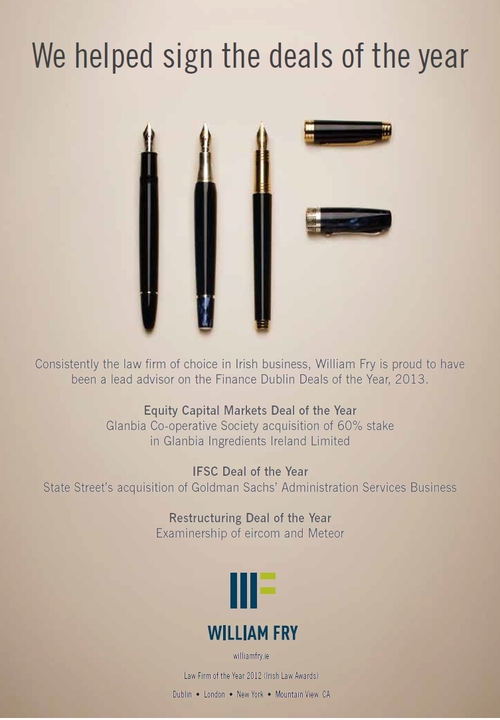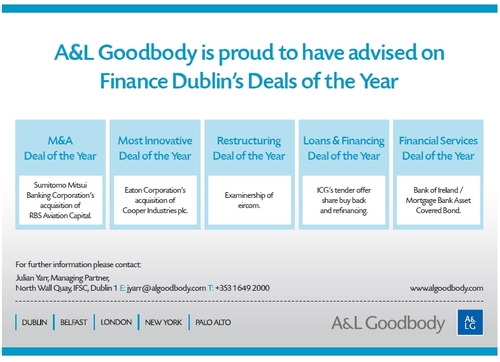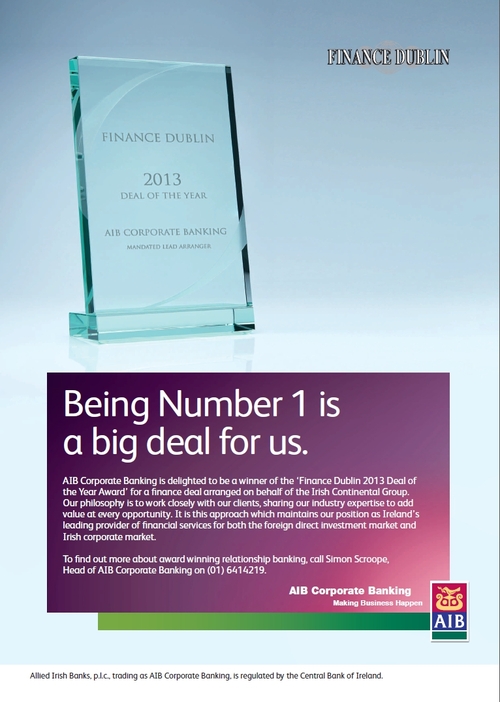M&A Deal of the Year: $7.3 billion sale of Dublin-based RBS Aviation Capital to SMBC was a global event in aircraft leasing
The deal created an Irish-based powerhouse in the aircraft leasing industry with a growth agenda backed by a strong parent company.
Sumitomo Mitsui Banking Corporation and Sumitomo Corporation’s acquisition of RBS' aviation unit has won this year's M&A Deal of the Year. The deal is the largest sale ever of an aircraft leasing business and the biggest disposal by RBS since its UK government bailout. It is the biggest overseas takeover by a Japanese bank since at least 1999. In completing the takeover of RBS Aviation by Japan's second largest bank, Sumitomo Mitsui has given the green light for one of the 'jewels in the crown' of the aircraft leasing industry in Ireland to grow and expand.
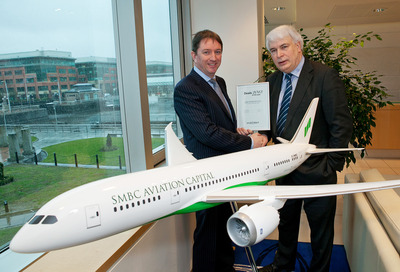
Peter Barrett, CEO, SMBC Aviation Capital receiving the M&A Deal of the Year from Ken O'Brien, editor, Finance Dublin.
The divestiture is in line with RBS' strategy of reducing its non-core portfolio to strengthen the group’s balance sheet. It will enable Sumitomo Mitsui Financial to further expand and develop the aircraft leasing business in Asia and other emerging markets.
The newly renamed SMBC Aviation Capital already has a fleet of 206 aircraft and orders for another 87 units. It currently employs 69 specialists based in Dublin and eight other locations in Europe, the US and Asia. It ranks as the world's fourth largest leasing company but has effectively been in a holding pattern since the turmoil that enveloped RBS after 2008. The trauma which afflicted its parent inevitably postponed development of the leasing company as it focussed on cashflow generation and profitability. While these two attributes continue to be key aspects of the company's business model the deal gives it the backing of a rich parent that can be leveraged to secure competitively priced capital in support of the business.
Some of the most important consequences of the sale, include: (1) a portfolio of 206 aircraft and commitments for a further 87 are taken over by a company promising a growth agenda; (2) the valuation was at 1.04x book, providing a reassuring metric in an industry where three of the four quoted entities trade at a discount.
The sale is telling for valuations of aircraft leasing firms. Given the turmoil in financial markets, and the absolute scale of the company itself, the successful disposal of RBSA as a single entity at a premium to book value can be deemed a very significant result for RBS and its advisers.
'From the company’s perspective, the transaction has been a substantial success on all fronts. Not only do we now have new owners who are clearly committed to helping us achieve our ambitious plans for the future, but we have also been able to merge their existing aircraft leasing-related assets with our operations to create a platform with increased scale, expertise and product offerings. In addition to these considerable financial and operational benefits, the whole process went remarkably smoothly given the size and complexity of the deal, and the strong underlying performance of the business both during and since the transaction is a great testament to that,' said Peter Barrett, CEO of SMBC Aviation Capital.
'This deal is the biggest ever global sale of an aircraft leasing business and the largest disposal by RBS since its UK government bailout. It is the biggest overseas takeover by a Japanese bank since at least 1999. Ireland's position as a global hub in aviation leasing and A&L Goodbody’s cutting edge knowledge of this sector enabled us to deliver high end effective Irish law advice and guidance in relation to the Irish and global market to a complex multinational deal,’ said Catherine Duffy, partner in the banking and financial services department and head of aircraft finance at A&L Goodbody.
'This was one of those rare deals where both sides walked away extremely satisfied. It gave the buyers access to a first class management team and portfolio and was an investment in world-class assets that offer a strong yield. And for the sellers, it was a fair price,' said Ben Davey, managing director, co-head of FIG Group, EMEA at Barclays.
'The consortium of buyers were first and foremost attracted by the strength of this particular management team and how they handled their portfolio. The management of this aviation unit also presented a really healthy and credible growth plan. They have a proven track record in profitable portfolio management, skilled acquisitions and on-selling,' said Davey.
‘It was a competitive process. The diligence procedures required for such a large portfolio were challenging but this was handled well by management. The complexity of extracting the aviation unit from RBS was also tricky in that it was run as a separate business but there were some elements of overlap – but again, this was handled well,' he said.
Financial Services Deal of the Year: BOI's covered bond issuance a major breakthrough for Irish banks to access debt markets
The deal paved the way for AIB to issue covered bonds in the months following this deal.
Bank of Ireland's covered bond issuance has won this year's Financial Services Deal of the Year. The deal is significant in that it was the first time an Irish bank had accessed the public debt markets since the financial crisis. The success of the issuance opened the door for AIB to issue covered bonds and signaled the beginning of what perhaps will be the start of the Irish banks funding themselves independently without a Government guarantee.
'We at A&L Goodbody were delighted to be involved in this deal as advisers to Bank of Ireland. It was clearly a significant transaction for Bank of Ireland, and it reflected very well on the robustness of the ACS product. The deal was particularly opportune, as we had recently worked closely with Bank of Ireland in updating their ACS Base Prospectus to the new standards required under the amended Prospectus Directive and Regulation. This facilitated speedy execution of the deal and issue of the bonds,' said Ciaran Rogers, partner and head of the banking and financial services department at A&L Goodbody.
‘This deal marked a huge step forward for the Irish financial sector, evidencing the ability of Irish banks to access the debt capital markets on an unguaranteed basis. As the credit risk is a combination of Bank of Ireland risk and risk on Irish residential mortgages, it represents a very strong statement as to investors’ views of the Irish economy. It was pleasing to see that AIB were able to follow the Bank of Ireland lead and also issue covered bonds, again on an unguaranteed basis,’ said Cormac Kissane, partner at Arthur Cox.
Financial Services Deal of the Year: Bank of Ireland successfully returned to the Irish covered bond market in 2012
With the deterioration in the Irish economy during 2010 and the challenges facing the banking sector, Bank of Ireland’s ability to access wholesale funding markets was severely curtailed for a prolonged period. While the Bank arranged a number of bilateral secured funding transactions in 2011, access to public funding markets was limited, particularly in unguaranteed format. The backdrop remained very challenging coming into 2012, as concerns regarding the European sovereign debt crisis remained elevated. Sentiment towards Ireland improved steadily during the year however, bringing public issuance at sustainable levels within reach for the bank.
Identifying the need to actively re-engage with the market, Bank of Ireland initiated a focused debt investor relations strategy in the spring of 2012 across key financial centres, repeating a similar exercise in the autumn of 2012.
The aim of this strategy was to update the market on the economic progress being made in Ireland, and the significant progress made by the bank in restructuring its balance sheet since the Central Bank of Ireland’s 2011 stress tests. A core element of this exercise was also to highlight some of the key benefits of the legislation underpinning Irish covered bonds.
This process helped to educate the potential investor base about opportunities in Ireland from investing in Irish covered bonds, and was well received by the market helping to support a rally in Bank of Ireland’s bonds in the secondary market.
The challenge then shifted to identifying appropriate demand amongst a diversified pool of investors at a price that appealed to both the bank and the buyer base. The key was to deliver a transaction that clearly marked a sustainable return to public issuance. Building on the positive market backdrop towards the end of the year, the bank decided to issue €1 billion in un-guaranteed Irish covered bonds with a three year maturity. The end result exceeded all expectations, with demand of c.€2.5 billion for the €1 billion transaction, sold to c.200 investors across a diversified range of regions and investor types. The considerable interest enabled the bank to price the transaction at the tight end of pricing guidance.
The secured debt, which is backed by BOI’s Irish residential mortgage book, is set to be a key element of the bank’s long term funding strategy, thus supporting the bank’s commitment to Irish residential mortgage lending and investment in Irish franchises.
The transaction had significant positive implications for Bank of Ireland and Irish banks. It represented the first public benchmark transaction in unguaranteed format for over 3 years, and was a very important step for the bank in returning to a more sustainable and normalised funding position.
Indeed, the ability to issue unguaranteed debt secured on the bank’s Irish residential mortgage book at a sustainable cost of funding would have seemed out of reach earlier in 2012, with the bank’s existing bonds trading at yields of over 10 per cent in the secondary market.
The significance of this issuance received international recognition and the transaction was described by Ireland’s finance minister, Michael Noonan, as a “milestone on the path to full independence for the country’s banks”. - Darach O'Leary is head of wholesale funding at Bank of Ireland.
Equity Capital Markets Deal of the Year: Transformative deal for Glanbia and the industry will facilitate the expansion of dairy processing in Ireland
The deal, which clarifies Glanbia's dairy strategy, has been a major contributor to a significant re-rating in the company's share prices.
Glanbia has been awarded this year's Equity Capital Markets Deal of the Year. It is given for the acquisition of Dairy Ingredients Ireland business and the associated capital raisings in the public markets that were used to finance the acquisition. The transaction involved the sale by the plc of 60 per cent of its Dairy Ingredients Ireland business to the Co-op, the plc’s majority shareholder, and the entry into a dairy processing joint venture by the plc and the Co-op.
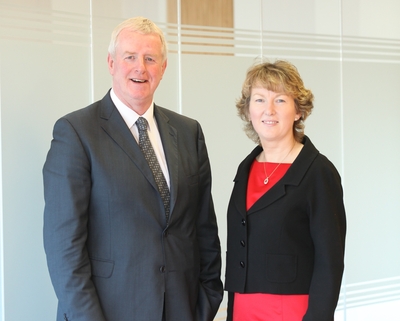
John Moloney, managing director, and Siobhan Talbot, group finance director, Glanbia plc.
The deal was a multi-faceted and complex transaction that was a transformative deal that clarified the group’s strategic approach to milk expansion opportunities arising from the abolition of EU milk quotas in 2015. Since the deal completion last November, the new joint venture company, GII, has been progressing plans to expand its dairy processing capacity with a €180million investment programme, financed on a standalone basis, without recourse to its shareholders.
'This was a landmark transaction with our majority shareholder that has enabled Glanbia to focus its resources on international growth whilst reducing exposure to global dairy markets and potential earnings volatility. For its part the Society has secured 60 per cent ownership of a business that is strategically important to farmers, with an option to acquire 100 per cent ownership over the next five years,' said John Moloney, managing director of Glanbia plc.
'The deal was highly effective but was complex to the extent that any reduction in the Society’s plc stake below 51 per cent required the approval of 75 per cent of Society members attending and voting at each of two successive Society General Meetings. Following the deal Glanbia’s stock liquidity has improved, the Society is now cash rich with a continuing 41.3 per cent stake in the plc and, members directly and personally received €172 million of value that they helped create,' said Siobhan Talbot, group finance director of Glanbia plc.
'The joint venture was an industry-defining transaction, which will facilitate the anticipated expansion of dairy processing in Ireland following the abolition of EU milk quotas in 2015. It is envisaged that farmers will seek to increase existing peak dairy processing capacity by up to 60 per cent,' said Brian Farrell, director of IBI Corporate Finance.
'The transaction involved complex structuring, incorporating a hive-down of the target's assets and a multi-layered consideration structure, as well as the negotiation of modified operating and governance structures for the business,' said Farrell.
'The transaction required the approval of Glanbia plc shareholders as well as the passing of two votes by the Co-operative members. Subsequent to the completion of the joint venture, but connected with the transaction, the Society members voted to reduce its shareholding in Glanbia from c. 51 per cent to c. 41 per cent by way of a spin-out and share sale,' he said.
'Glanbia has seen a significant re-rating in its share price in recent months as the group’s dairy strategy has been clarified and the business focuses on higher growth international nutritionals and cheese businesses,' he said.
'This deal is significant for a number of reasons. First, it is in effect a reversal of the process carried out some thirty years ago whereby what was then a co-op owning a dairy processing business became a publicly owned business albeit a plc which was majority controlled by the co-op. Now the farmer members have returned to having more direct control over the key business issue for them, namely the price of milk but still with the benefit of plc know how and financial discipline as a minority shareholder,' said Ciaran Bolger a partner at Arthur Cox.
'Secondly, it allows the financing by the new joint venture company of the very significant cost of building an entirely new milk processing facility, which will be by far the largest in Ireland, to be ring-fenced to this separate business, as the plc will only be a minority shareholder who will not be required to guarantee the financing. It therefore allows the plc to deploy its own capital and human resources to its international businesses (US cheese, food ingredients and nutritional and supports supplements) which attract a considerably higher multiple in the financial markets,' said Bolger.
'From a legal point of view, the deal was extremely complex due to (a) ensuring that issues of potential conflict between the plc and the coop, who have many common directors, were properly resolved, (b) the complexity of the commercial and business arrangements between the Dairy Ingredients Ireland business and the remaining businesses retained by the plc and (c) the related party aspects of the transaction,' he said.
Debt Securities Deal of the Year: Ryanair Ex-Im bond the lowest ever spread for this type of instrument
The airline took advantage of low interest rate conditions and got the lowest spread to mid-swaps of any previous airline with this deal.
Ryanair's $194.3 million Ex-Im Bank guaranteed pre-funded note, has won the Debt Securities Deal of the Year. The sale of the pre-funded notes backed by the US Export-Import Bank on September 6th 2012 were sold for 1.741 per cent. The notes, due in 2024 were to fund seven Boeing 737s and was the lowest spread for a bond guaranteed by the Export-Import Bank of the United States ever. The transaction was more than three times oversubscribed. The cheap capital attained is a testament to the strength of Ryanair's reputation.
Jimmy Dempsey, Ryanair’s treasurer, told Finance Dublin that, 'The deal was a pre-funded US dollar denominated capital markets issuance backed by US Export Credit Agency support guarantees (commonly known as an Eximbond). The funding was used to finance new aircraft deliveries to Ryanair between September 2012 and December 2012.'
'This was the third Exim-bond we have completed however it was the first by Ryanair under a new pre-funded Exim-bond structure allowing us to drawdown the debt in advance of the aircraft deliveries. This helped Ryanair to choose the timing of the issuance to achieve very attractive funding costs. At the time of pricing we achieved the lowest spread to mid-swaps of any previous worldwide airline Exim-bond issuance resulting in an all-in cost 1.74 per cent for 12 year amortising debt. We had specifically targeted late August/early September to launch the deal to take advantage of the low interest rate conditions prevailing at the time,' he said.
'What was also beneficial was that we swapped the US dollar denominated Ex-Im bond into euros, taking advantage of the basis swap difference between US Dollar and Euro and at the same time removing any associated currency risk for the life of the 12 year bond for the group. This swap had the added benefit of improving the all-in coupon price we achieved on the transaction,' he added.
'Ryanair does not have any immediate debt requirements given the strong cash position and the fact that we have completed our delivery programme with Boeing. We will have some need for re-financing our existing fleet of aircraft originally delivered between '02 and '05 and will most likely use the US capital markets during 2014 to take advantage of the strong EETC market and other similar financing products,' said Dempsey.
'Since 1999, 60 per cent of our fleet of 305 aircraft have been funded with export credit support through a combination of capital markets issuance and bank debt from some of the leading international aviation financing banks including BNP Paribas and Citibank. In addition we have funded over 70 aircraft deliveries via sale and leaseback arrangements, such as the transactions we've completed with other Irish based leasing companies including Avolon, Banc of America Leasing, SMBC Aviation. We've also used Japanese operating leases with a call option (JOLCOs) for 10 per cent of our fleet,’ he said.
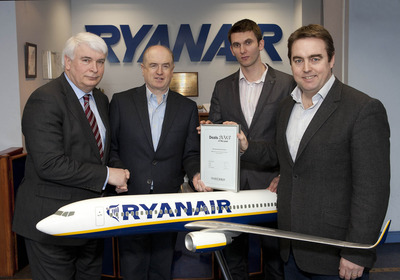
(L-R) Ken O'Brien, editor, Finance Dublin; Howard Millar, Deputy CEO and CFO, Ryanair; John O'Flynn, Treasury Manager, Ryanair; and Jimmy Dempsey, Treasurer, Ryanair.
Hilary Marren partner at McCann FitzGerald said, 'An interesting feature of the transaction was the pre-funded nature of the bond which allowed the funding to be drawn down without having to wait for all the aircraft to be delivered and therefore avoiding the need to arrange for intermediate/bridge funding.'
BNP Paribas said, 'At the occasion of Ryanair September 2012 transaction, BNPP co arranged the first Pre funded US-Exim guaranteed Bond whereby, contrary to traditional US-Exim Bond, the pre funded bond is issued before the delivery of the aircraft and proceeds of the bond are on deposit before being used to pay Boeing on actual delivery of the aircraft. The 12Y Loan Note, maturing in October 2024, benefits from first demand guarantee from Export-Import Bank of the United States of America, which guarantee is backed by the full faith and credit of the United States of America. The USD 194 m Issuance took place in September 2012, with delivery of the aircraft occurring in the next following three months. Several other Pre Funding bonds to other airlines have been arranged since then.'
'Ryanair, despite being a EUR oriented airline, did its first USD denominated Exim financing with BNPP in 2010, considering it was cheapest to them to borrow in USD and convert the loan in EUR through the use of cross currency swap. Ryanair decided to replicate this USD borrowing in the 2012 Exim bond, and needed as well to secure net funding in EUR. BNPP played the role of swap coordinator and executing bank, offering 100 per cent underwriting cross currency facility. The cross currency swap was “pre-placed” just prior to bond pricing, then novated to third party banks at bond issuance,’ said BNP Paribas.
IFSC Deal of the Year: State Street's acquisition of Goldman Sach's hedge fund servicing business increases its foothold in the sector
The deal is an example of the IFSC becoming a driver for Irish M&A activity.
State Street Bank & Trust Company’s acquisition of Goldman Sachs Administration Services has won the IFSC Deal of the Year. The acquisition reinforces State Street's worldwide hedge fund administration business.
It was a major international transaction which saw State Street agree a deal to buy the Goldman Sachs international business in Ireland, the US, China and Singapore. Ireland was a key part of this business with the US branch. The Irish business constituted approximately a third of the overall global hedge fund administration business of Goldman Sachs.
'This acquisition is a great development for our hedge fund business. Our organisations share a common approach to partnering with our hedge fund clients, allowing us to deliver high-quality, uninterrupted service throughout the transition. We are committed to making sure that the integration is a good experience both for the clients involved and the GSAS teams that have joined us. Already we are seeing good results in both respects,' said Pat Hayes, head of State Street’s hedge fund servicing operations in Europe.
Bob Keogh, who headed the GSAS team in Ireland and is now a senior managing director with State Street in Ireland said: 'The move to State Street has gone very smoothly, and our organisations’ similar cultures have helped the process. This transaction better positions us to offer clients an enhanced product offering in areas like regulatory compliance, risk and transparency solutions.'
'Servicing alternative assets is a strategic focus for State Street and I believe this acquisition has strengthened our global leadership considerably. We have a history of making good acquisitions in our alternatives business, with a number of these involving teams based in Ireland. I think we have demonstrated that we are good at making the best use of our talent - a key to bringing our clients new and better solutions. I am very confident that the GSAS acquisition will make a significant contribution to our future success,' said George Sullivan, executive vice president and head of State Street’s Alternative Investment Solutions globally.
'This major international transaction saw State Street buy the Goldman Sachs hedge fund administration business in Ireland, the US, China and Singapore. Ireland was a key part of this business. The deal is another example of the IFSC becoming a driver not only for more international financial services business but a driver for M&A activity as well,' said Bryan Bourke, head of corporate & M&A at William Fry who worked on the State Street deal.
Loans and Financing Deal of the Year: ICG deal one of Ireland’s few tender offer share buy backs
The deal involved a very innovative funding structure.
Irish Continental Group’s tender offer, share buy back and refinancing has won the 2013 Loans and Financing Deal of the Year. The deal involved a €150 million loan facility provided by a group of syndicated banks arranged by AIB.
The deal allowed ICG to complete its successful tender offer share buyback in Q4 of last year, which is one of very few share buy backs undertaken in Ireland. The deal is a testament to the strength of ICG's successful international business as the deal was constructed in what is a difficult environment for financing.
AIB were singled out for their work in the deal by ICG. Speaking to Finance Dublin, Tom Corcoran the company secretary for Irish Continental Group Plc said, 'We compliment AIB on their innovative approach in putting together a financing package on terms attractive to the company and in bringing it to a successful conclusion in an otherwise difficult market environment.'
'Irish Continental Group plc is a great example of an Irish company successfully competing in international markets and we were very pleased to be able to assist ICG in its recent financing and capital structure re-profiling by way of tender offer share buy back. It was a very innovative funding structure, there have been very few tender offer share buy backs undertaken in Ireland in the past twenty years and this was the first time that one has been structured using external financing. Working closely with ICG's management team we were able to devise a structure that enabled the transaction which included the provision of €150 million of funding by an Irish syndicate of banks made up of AIB, Bank of Ireland and Ulster Bank and was structured through an Isle of Man subsidiary borrower of ICG plc,' said Peter Murray, partner in the banking and financial services department at A&L Goodbody.
Loans & Financing Deal of the Year: Lead arranger AIB on how the deal was done
ICG is an excellent business which continually delivers first class results to both its customers and its shareholders. AIB Corporate Banking’s core competence is working with clients such as ICG in delivering a full suite of bank products/services and complex corporate debt structures.
ICG is an excellent business which continually delivers first class results to both its customers and its shareholders. AIB Corporate Banking’s core competence is working with clients such as ICG in delivering a full suite of bank products/services and complex corporate debt structures.
The financing evidences AIB Corporate Banking's appetite and ability to support key Irish corporates and large SMEs.
AIB Corporate Banking successfully brought together and led a strong banking syndicate of domestic and international banks to execute the deal. AIB led the syndicate, and the banking group worked together to deliver the required level of facilities in a structure that worked for the client and the banks.
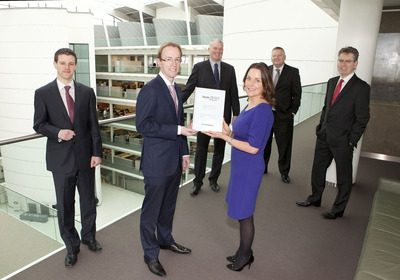
The AIB Corporate Banking team, who worked on the ICG deal (L-R) Conor Morgan, Diarmuid O'Neill, Eoghan O'Neill, Rosemary Wilson, Simon Scroope and Aodhan Hobb.
The deal structure was tailored to meet the specific requirements of the client. The €150m facility allowed ICG to complete its successful tender offer share buyback in Q4 of last year. The facility also provides committed working capital financing to ICG for the years ahead.
Given the overall size and structure of the debt facilities AIB Corporate Banking needed to identify and negotiate with a number of banks, ultimately bringing together a club of domestic and international banks with a similar desire to support the Irish economy through provision of structured term debt and committed working capital facilities.
AIB Corporate Banking’s core role was to listen, understand, coordinate and negotiate and ultimately provide solutions for the client and simultaneously work toward satisfying the requirements of each bank.
The key challenge was structuring the loans and security in a tight timeframe and at the same time addressing all considerations of all parties involved.
This involved innovative structuring of security over marine assets. As lead arranger, AIB Corporate Banking led all commercial, legal and accounting due diligence on the deal structure.
Prior to forming the banking group, we worked closely with ICG's experienced management team to devise a deal structure that met their requirements. This meant that all key considerations were addressed upfront and that an attractive well thought through bankable structure was brought to the banking group. We then worked with the banking group to resolve any issues that came about.
Our solid working relationships with a strong local and international banking group and our knowledge of debt structuring and legal documentation all contributed to delivering within a tight execution timeframe and ultimately meeting the client's requirements. - Diarmuid O'Neill is head of corporate banking Ireland at AIB.
Most Innovative Deal of the Year: Eaton's acquisition of Cooper Industries was the largest public offer for a company in Irish history
The deal shows how a successful acquisition of an Irish incorporated multinational can be done whilst complying with both the Irish and US regulatory and legal regimes.
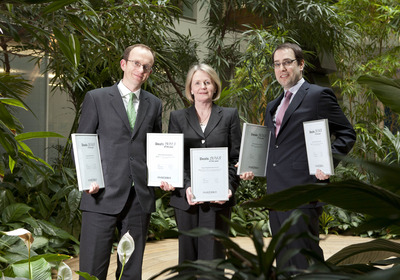
(L-R) David Baxter, head of restructuring; Catherine Duffy, partner in the banking and financial services department and head of aircraft finance and Alan Casey, partner with A&L Goodbody's winning deals.
Eaton Corporation’s $13 billion acquisition of Cooper Industries plc has won the Most Innovative Deal of the Year. In addition to being the largest M&A in 2012 it also was innovative in that it involved the negotiation of a complex cross-jurisdictional regulatory environment and was the first large scale public takeover, using cash and shares, of a significant NYSE listed Irish incorporated company. The deal also required significant and novel tax structuring advice, involving complex stamp duty and corporation tax issues interacting with difficult and stringent requirements on the corporate aspects. The regulatory regimes of the SEC and the Irish Takeover Panel impose competing timetable requirements which required advisers to obtain - for the first time in Irish corporate history - Irish Takeover Panel consents to significant divergences from the standard takeover timetable.
The transaction was also innovative in that it is the first time that one of the companies which recently redomiciled to Ireland has been acquired. In addition, this was achieved by way of a structure where the New York Stock Exchange listed holding company resulting from the transaction is an Irish plc.
The transaction involved the establishment of a new Irish holding company (Eaton Corporation plc) which will, following the consummation of the transaction in the second half of this year, result in an Irish company listed on the New York Stock Exchange with a market capitalisation of over US$25 billion. Under the terms of the transaction, the new Irish holding company indirectly merged with Eaton Corporation (through its US subsidiary) and Eaton shareholders acquired shares in the Irish holding company. At the same time the Irish holding company acquired Cooper Industries plc pursuant to an Irish court-approved scheme of arrangement. Cooper shareholders received ordinary shares and cash worth approximately USD$11.8 billion under the terms of the scheme of arrangement.
'Eaton Corporation’s $13 billion acquisition of Cooper Industries plc was the largest M&A transaction in Ireland in 2012 and the largest in Eaton’s 101 year history. It is a transformational milestone for Eaton that expands its market segment reach, broadens its portfolio of products and strengthens its global geographic footprint. It has resulted in the creation of an Irish headquartered listed company with over 100,000 employees worldwide, selling products to customers in more than 150 countries,' said Patrick Spicer, partner and head of the corporate and commercial law department at Matheson.
'We were delighted to have been instructed by Eaton on the largest public offer for a company in Irish history and 4th largest worldwide this year. This is not the first time we have had the opportunity to apply this unique deal structure which we formulated for use in the successful completion of Elan Corporation's 2011 $1 billion merger of its Elan Drug Technologies business with Alkermes and in Jazz Pharmaceuticals' 2012 combination with Azur Pharma. This deal was particularly innovative as it was the first large scale public takeover, using cash and shares, of a significant NYSE listed Irish incorporated company,' said Cian McCourt, resident partner in A&L Goodbody's New York Office.
'It was an indication of the confidence international investors have in Ireland’s stable and business friendly tax regime that Eaton chose to locate here,' said Fintan Clancy, partner, Arthur Cox.
‘We were delighted to have acted for Cooper on this transaction, it having been one of the first US listed multinationals to have moved its place of incorporation to Ireland. The recommended transaction with Eaton is of importance for a number of reasons, not least because it shows how a successful acquisition of an Irish incorporated multinational can be achieved whilst complying with the requirements of both the Irish and US regulatory and legal regimes,' said Chris McLaughlin, partner, Arthur Cox.
‘The $13 billion acquisition of Cooper is a transformational milestone that expands our market segment reach, broadens our portfolio of products, services, and solutions, and strengthens our global geographic footprint,’ said Alexander M. Cutler, Eaton chairman and chief executive officer.
Restructuring Deal of the Year: Eircom restructuring - 'the model for all future examinerships'
The deal resulted in a reduction of debts from €4.1 billion to €2.3 billion.
The examinership of eircom and Meteor has been awarded this year's Restructuring Deal of the Year. The examinership finished in June 2012, just over a year after the restructuring process had begun, and resulted in a reduction of debts from €4.1 billion to €2.3 billion. Due to its complexity the deal involved a number of groundbreaking elements that establishes a number of processes that future examinerships in the State can utilise. Justice Peter Kelly in the Irish High Court commented that this was the model by which all examinerships will now be judged.
'Eircom is an enormously important business for Ireland and we were very pleased to be involved in what was a complex and innovative restructuring of its debt,' said Eugene McCague, chairman of Arthur Cox.
'The fact that international lenders agreed to support the restructuring of eircom through examinership is testament to the flexibilty offered by the process compared to restructuring processes in many other jurisdictions,' said McCague.
'What stands out in the eircom examinership is the size of the debt restructuring and the speed in which the process was successfully concluded. In all, €1.4 billion of a total debt stack of c. €4 billion was written off the balance sheets of the eircom operating companies. While the key components of the restructuring were confirmed by the Irish High Court just 54 days after the companies entered examinership, there was extensive planning before the commencement of the process. We were engaged by the co-ordinating committee of eircom's senior lenders, now the owners of the companies. This restructuring also demonstrates the advantages of examinership as a one-stop restructuring shop, a flexible process that allows for both the write-off of debt and the change of control of ownership,' said David Baxter, head of restructuring & insolvency at A&L Goodbody.
'We advised ComReg during the examinership of eircom Limited and related companies. ComReg is the statutory body responsible for the regulation of the electronic communications sector. From a regulatory perspective the examinership was unique in that it is the largest case of an examinership of an entity that is subject to regulation from various EU Directives transposed into Irish law in a series of Acts and Statutory Instruments. The survival of eircom Limited as a result of the examinership process is an example of how an entity in a regulated sector can avail of a restructuring process and survive as a going concern thereby preserving the trade of the business and employment,'' said Fergus Doorly partner at William Fry.
'The eircom examinership was remarkable for the alacrity with which the process was conducted, given the scale and complexity of the debt being restructured. The significant level of pre-planning around what was by some distance the largest examinership to date in Ireland, was critical to achieving a successful restructuring of a group which is of key strategic importance to the State,' said Robin McDonnell, insolvency partner at Maples and Calder.
‘The eircom examinership was an excellent opportunity to showcase on an international stage the Irish examinership process,' said William Day, partner at Arthur Cox.
Restructuring Deal of the Year: The Diary of a winning Examinership
By Arthur Cox
In early 2011 the company signaled that covenants were under threat and a restructuring process began in May 2011.
• Initially a CoCom was formed by the Senior Lenders and waivers negotiated. The next stage was to ensure that the business had a robust business plan and strategy around how the decline in EBITDA would be arrested.
• Once the business plan had been produced, reviewed and tested, it was necessary to ascertain an accurate valuation of the business that could be used as the basis of an initial restructuring proposal. This was done as a desktop exercise then latterly it was supported by an M&A process.
• Finding a restructuring solution with a large and diverse banking syndicate (over 200 institutions from a wide variety of jurisdictions)
• The operating companies in the Group are Irish incorporated. Above the operating companies, there were a number of English and Cayman Island companies. Consideration was given to restructuring the Group at a higher level in the Group through the use of a combination of a UK Scheme of Arrangement and a Cayman Island receiver. Ultimately, because of the flexibility inherent in the Irish examinership process, it was decided to seek the appointment of an examiner to the Irish operating companies.
• A number of out of the money creditors agitated and threatened to block any restructuring through taking action with the legal structure in other jurisdictions. A number of defensive strategies were quickly put in place.
• STT Telemedia submitted their own restructuring proposals up until December 2011 when they withdrew from the process.
• A last minute bid from Hutchinson Whampoa was made during the examinership period. The examiner, company and lenders successfully argued that the bid could not be considered due to the uncertainty of delivery and value.
• On 11 June 2012 the examinership was concluded and the business emerged under new ownership and with debt reduced from €4.1 billion to €2.3 billion.

